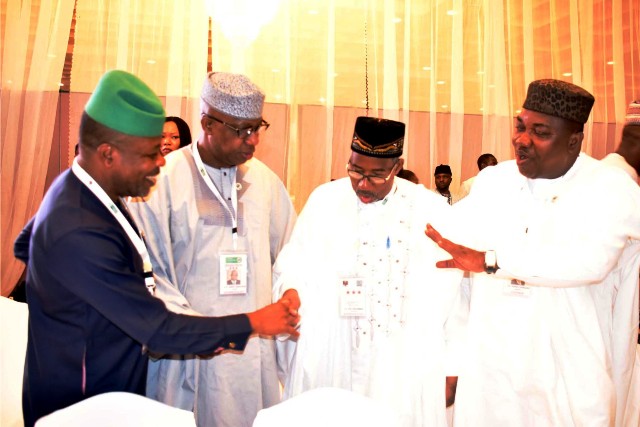Business
FG Reiterates Commitment To Industrialisation

The Federal Government has reiterates its commitment to realisation of the Nigeria Industrial Revolution Plan (NIRP).
Nigeria’s Minister of Industry, Trade and Investment, Dr Okechukwu Enalamah, said last Friday at the inauguration of the Nigeria Competitiveness Project (NICOP) that the government was poised to realise the NIRP through its commitment to the development of Micro, Small and Medium-Sized Enterprises (MSMEs) in the country.
Represented by Mr Edet Akpan, the ministry’s Permanent Secretary, Enalamah said the MSMEs would be given serious attention because of their role in economic diversification.
He said the project sponsored by the European Union (EU) and the German Development Cooperation (GIZ), would complement other government initiatives.
“Nigeria is endowed with human and natural resources, and for the country to attain its full potential, we cannot afford to ignore the MSMEs and their contribution to the economy.
“As a developing nation, we are making effort to transform the economy by initiating programmes and policies that will help improve the standard of living,” he said.
The minister also said that government was working hard to promote social and political stability especially with the ongoing programmes on economic diversification.
Speaking at the event, the EU Ambassador to Nigeria, Karlsen Ketil said the union in collaboration with the GIZ had, in support of NICOP, earmarked about 10 million euros for MSMEs development.
Ketil noted that the support for the development of MSMEs became pertinent due to population growth and the alarming rise in unemployment in the country.
“There is no better way to create jobs in Nigeria than to produce our own goods, this is better than sending raw materials abroad and importing the finished products,” he said.
Economic Development Cluster Coordinator of GIZ-Nigeria, Hans-Ludwig Bruns, said that NICOP was a four-year project commissioned by the German government and co-funded by the EU.
“NICOP will assist MSMEs to add value to and migrate towards new and higher level tasks along selected value chain such as tomato, pepper, chilli, ginger, leather and garments.
“It is also aimed at promoting structural transformation, overcoming coordination and linkage failures as well as improving access to regional and international market,” he said.
He further stated that NICOP would provide support across three major pillars such as technical, access to finance and investment.
Transport
Automated Points Concession : FAAN Workers Gave 72hrs To Revise Decisions In PH

Transport
FAAN Announces Pick-Up Points for Go-Cashless Cards

Business
Fidelity Bank To Empower Women With Sustainable Entrepreneurship Skills, HAP2.0
-

 News5 days ago
News5 days agoAmend Constitution To Accommodate State Police, Tinubu Tells Senators
-

 Politics5 days ago
Politics5 days agoSenate Urges Tinubu To Sack CAC Boss
-
Business5 days ago
Crisis Response: EU-project Delivers New Vet. Clinic To Katsina Govt.
-
Business5 days ago
President Tinubu Approves Extension Ban On Raw Shea Nut Export
-

 News5 days ago
News5 days agoDisu Takes Over As New IGP …Declares Total War On Corruption, Impunity
-
Business5 days ago
Fidelity Bank To Empower Women With Sustainable Entrepreneurship Skills, HAP2.0
-
Business5 days ago
President Tinubu Extends Raw Shea Nuts Export Ban To 2027
-
Sports5 days ago
NDG: Rivers Coach Appeal To NDDC In Talent Discovery

